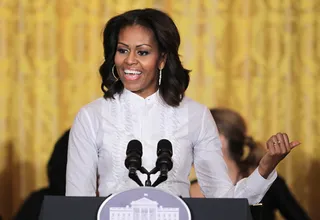Getting Schooled: African-Americans and Education
Blacks are twice as likely to go back to school as whites.

1 / 14
The Obama Education Initiative - Last November First Lady Michelle Obama pledged to help the U.S. have the highest percentage of college graduates by 2020. Although many Americans may disagree with the Obama administration’s stance on the importance of higher education, the Pew Research Center released a study, The Rising Cost of Not Going to College, which revealed that those who have a bachelor’s degree or higher have higher employment rates, annual income and a better chance at avoiding poverty. BET.com takes a look at education statistics for African-Americans. —Dominique Zonyéé (@DominiqueZonyee)(Photo: AP Photo/Carolyn Kaster)

2 / 14
The Consensus - Educational statistics have always been disproportionate for African-Americans in comparison to whites. Traditionally, African-Americans have a higher dropout rate, with fewer students graduating (on all education levels). A review of 2012 Census data indicates that 31 percent of African-Americans are in school, compared with 23 percent of whites. (Photo: Image Source/Getty Images)
Photo By Photo: Image Source/Getty Images

3 / 14
How Are Blacks Faring in High School? - The African-American high school dropout rate is higher than the national dropout rate, at 9.6 and 8.1 percent, respectively. In 2010, the Black high school graduation rate was 63.6 percent compared to the U.S. graduation rate of 80.6 percent. (Photo: Mario Tama/Getty Images)

4 / 14
High School Graduation Rate for Black Males - Black males have lower performance rates in high school than white males. Of Black males who entered the 9th grade in the 2006–07 school year, 52 percent graduated in four years, compared with 78 percent of white males.(Photo: Pablo Alcala/Lexington Herald-Leader/ MCT /LANDOV)

5 / 14
Black Males: From High School to Higher Education - The number of Black males who attend college is significantly low. The Black Male Student Success in Higher Education study revealed that 31.5 percent of Black men have their associate’s degree, 34.1 percent have their bachelor’s degree and only 28.2 percent have a master’s degree.(Photo: Tacoma News Tribune/MCT /Landov)
ADVERTISEMENT

6 / 14
College Graduation Rates in Black and White - The national college graduation rate (which applies to students who entered and graduated from the same institution within six years) for Black students is 44 percent. The rate for white students is 66 percent.(Photo: Mike Moore/Getty Images for University of Phoenix)
Photo By Photo: Mike Moore/Getty Images for University of Phoenix

7 / 14
How Does a College Education Benefit African-Americans? - Black enrollment in higher education institutions are at an all-time high. But with the increasing tuition rates and college debt, students are asking themselves does it pay to go to college? A new study shows that 83 percent of students who obtained an undergraduate degree said that it paid off financially and personally.(Photo: Getty Images)
Photo By Ana Abejon/Getty Images

8 / 14
Males vs. Females: College Graduation Rates - In comparison to their male counterparts, African-American females are performing at higher rates in high school and in college. The national college graduation rate for Black men is 33.1 percent compared with 44.8 percent for Black women, according to the U.S. Department of Education.(Photo: Henry Chaplin/Getty Images)

9 / 14
What Does This Mean for Historically Black Colleges and Universities? - HBCUs such as Howard University and Langston University have increased enrollment rates in 2013, while a majority continues to suffer from enrollment decline. However, African-Americans who graduate from a historically Black college or university do better financially than Blacks who graduate from traditionally white colleges and universities, according to 2011 study by economists at Morehouse College and Howard University.(Photo: Andrew Harnik/The Washington Times /Landov)

10 / 14
How Much Does College Cost? - The average cost of tuition and fees for the 2012-2013 school year was $29,056 at private colleges, $8,655 for in state and $21,706 for out-of-state residents attending public universities. Annual tuition and fee costs for HBCUs range from $24 634 for higher ranked institutions such as Spelman College to $11,602 annually (for out-of-state tuition) at Lincoln University. For more HBCU rankings and tuition costs, visit here.(Photo: Oxford/Getty Images)
ADVERTISEMENT

11 / 14
How Does Having a College Education Affect Career Goals? - Although 48 percent of African-Americans find college degrees useful, the rate at which Black college graduates are obtaining careers in comparison to “jobs just to get by” is disappointing. Compared to 59 percent of whites, 29 percent of African-Americans said their current job is their career, while 44 percent say they are working just to get by, according to the Pew study.(Photo: Michael DeLeon/Getty Images)

12 / 14
Factors for Low College Enrollment Rates - College tuition rates continue to increase while African-American household income remains stagnant. The unemployment rate for Black men 20 and over was at 13.7 percent (10.5 percent for Black women) in September, compared to 5.7 percent for white males in the same age group.(Photo: Justin Sullivan/Getty Images)

13 / 14
Back to School - When it comes to going back to school, those who do not have a bachelor’s degree are more likely to return to college than those who have a four-year degree. The desire to go back to school is significantly higher among Black Americans, as 43 percent of Blacks said they would return to school compared to 18 percent of whites.(Photo: Peathegee Inc/Getty Images)
